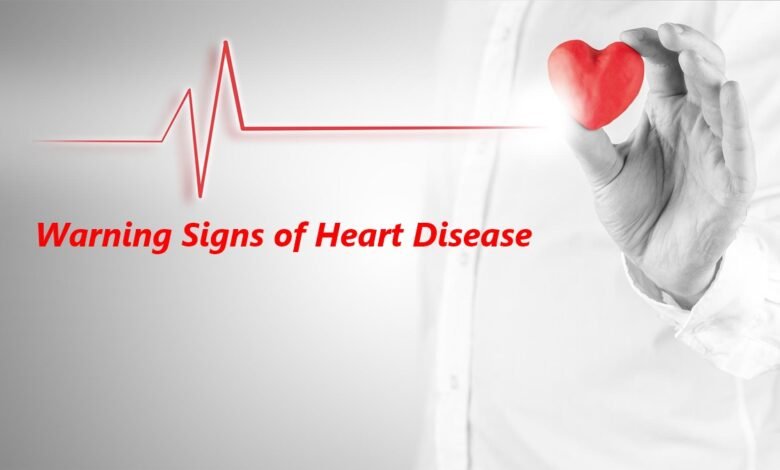11 Warning Signs of Heart Disease in 2023

Heart disease is a serious condition that affects millions of people worldwide. It is essential to be aware of the warning signs of heart disease to seek timely medical help and prevent complications. In this article, we will discuss the various warning signs of heart disease in 2023.
Heart disease is a broad term that encompasses several conditions that affect the heart and its blood vessels. It is a leading cause of death globally, and early detection plays a crucial role in managing and treating the disease effectively. By recognizing the warning signs, individuals can take appropriate actions to reduce their risk factors and seek prompt medical attention.
Read More: A Heart Attack Or A Panic Attack, Which Is It?
Understanding Heart Disease
Before delving into the warning signs, it’s important to have a basic understanding of heart disease. Heart disease refers to various conditions such as coronary artery disease, heart failure, arrhythmias, and valvular heart disease. These conditions can manifest differently and have different risk factors and treatment approaches. By understanding the different types of heart disease, individuals can better comprehend the associated warning signs.
Common Risk Factors
Several risk factors contribute to the development of heart disease. These include age, family history, high blood pressure, high cholesterol levels, smoking, obesity, diabetes, sedentary lifestyle, and poor diet. It’s crucial to be aware of these risk factors and make necessary lifestyle changes to minimize the chances of developing heart disease.
Warning Signs of Heart Disease
Recognizing the warning signs of heart disease can be a lifesaver. Here are some common signs and symptoms to watch out for in 2023:
Chest Pain or Discomfort
Chest pain or discomfort, also known as angina, is a common warning sign of heart disease. It may manifest as tightness, pressure, squeezing, or burning sensation in the chest. This pain may also radiate to the arms, shoulders, neck, jaw, or back.
Shortness of Breath
Unexplained shortness of breath, especially during physical exertion or even at rest, can be indicative of heart disease. It occurs due to the heart’s inability to pump enough oxygen-rich blood to meet the body’s needs.
Fatigue
Excessive tiredness or fatigue, even with minimal physical activity, can be a sign of heart disease. The heart’s reduced ability to pump blood efficiently can result in inadequate oxygen supply to the muscles and organs, leading to fatigue.
Dizziness and Fainting
Heart disease can cause dizziness, lightheadedness, or fainting spells. These symptoms occur when the brain doesn’t receive enough blood flow due to impaired heart function.
Irregular Heartbeat
An irregular heartbeat, also known as arrhythmia, is another warning sign of heart disease. It may feel like a fluttering, racing, or skipping a beat. It’s important to note any abnormal changes in heart rhythm and seek medical attention.
Swelling in Legs, Ankles, or Feet
Fluid retention resulting in swelling, particularly in the legs, ankles, or feet, can be a symptom of heart disease. This occurs due to the heart’s reduced ability to pump blood effectively, leading to fluid buildup in the body.
Persistent Cough
A persistent cough that produces pinkish or white phlegm can indicate heart failure. The weakened heart struggles to pump blood efficiently, causing fluid accumulation in the lungs and resulting in a persistent cough.
Nausea, Indigestion, or Heartburn
Unexplained nausea, indigestion, or heartburn, especially when accompanied by other heart disease symptoms, should not be ignored. It may be a result of reduced blood flow to the digestive system due to an underlying heart condition.
Cold Sweats
Experiencing cold sweats that are unrelated to physical exertion or external temperature changes can be a warning sign of heart disease. This symptom often accompanies chest pain or discomfort.
Pain or Numbness in the Arms
Pain, numbness, or tingling sensation in the left arm, right arm, or both can be associated with heart disease. These sensations occur due to referred pain from the heart, and their presence should not be overlooked.
Jaw Pain
Unexplained pain or discomfort in the jaw, especially on the left side, can be a warning sign of heart disease. Jaw pain often occurs alongside other symptoms such as chest pain or shortness of breath.
Back Pain
Although less common, persistent upper back pain can be an indication of heart disease, particularly in women. Back pain caused by heart disease may be felt between the shoulder blades or in the lower back.
When to Seek Medical Help

If you experience any of the warning signs mentioned above, it is crucial to seek immediate medical attention. Do not ignore or underestimate these symptoms, as prompt intervention can prevent further complications and potentially save lives.
Prevention and Lifestyle Changes
Prevention is key in reducing the risk of heart disease. Adopting a heart-healthy lifestyle can significantly improve heart health. This includes maintaining a balanced diet, engaging in regular physical activity, managing stress, quitting smoking, limiting alcohol consumption, and controlling underlying conditions like hypertension and diabetes.
Conclusion
In conclusion, recognizing the warning signs of heart disease is essential for early detection and timely intervention. By understanding the various symptoms associated with heart disease, individuals can take necessary precautions, seek medical help promptly, and make lifestyle changes to mitigate the risk factors. Prioritizing heart health is crucial for leading a long and healthy life.
Read More: Top 5 Reasons for High Blood Pressure
FAQs
Can young individuals develop heart disease?
Yes, although heart disease is more common in older individuals, younger people can also develop heart disease due to various factors such as genetic predisposition, unhealthy lifestyle choices, and underlying medical conditions.
Are all chest pains indicative of heart disease?
No, not all chest pains are related to heart disease. However, if you experience chest pain or discomfort, it is important to get it evaluated by a healthcare professional to rule out any potential heart-related issues.
Are men and women equally at risk of heart disease?
Heart disease affects both men and women; however, the symptoms and presentation may vary between the genders. Women may experience atypical symptoms, such as jaw pain or back pain, along with classic chest pain.
Can heart disease be cured completely?
While heart disease cannot be completely cured, it can be managed effectively through lifestyle changes, medications, and medical interventions. Early detection and timely treatment play a crucial role in controlling the disease and improving the quality of life.
How often should I get my heart checked?
It is recommended to have regular check-ups with your healthcare provider to assess your heart health. The frequency of check-ups may vary based on your age, risk factors, and medical history. Consult with your doctor to determine the appropriate schedule for heart health evaluations.







